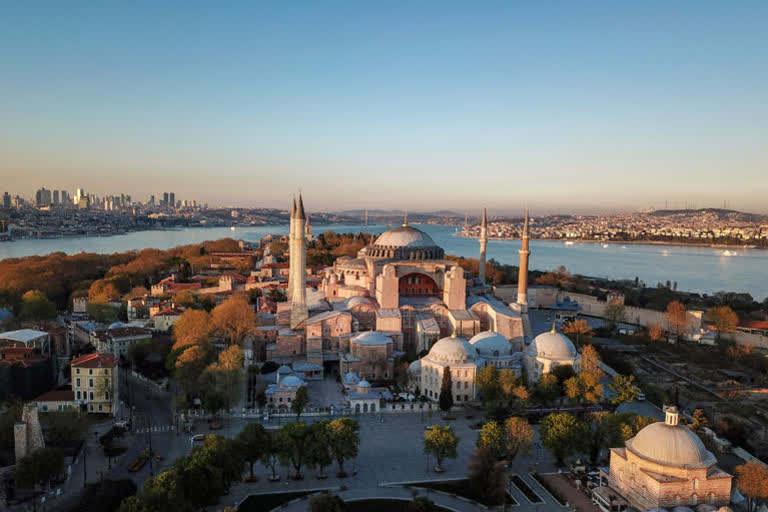New Delhi: There has been a considerable international protest over the Turkish president’s decision to revert Istanbul’s iconic Hagia Sophia into a mosque, a decision which hits at the very foundation of the modern Turkish state, envisioned in the early twentieth century by Kemal Ataturk, the founder of modern Turkey. A slew of governments, from neighbouring Greece to the United States, European Union and Russia, issued notes of concern and protest, while the Pope in the Vatican said he was “deeply pained” and UNESCO warned that the nature of the shrine’s world heritage status could be placed in doubt or even reversed and urged caution against “any decision that might impact the universal value of the site.”
However, from July 24, the Hagia Sophia will reopen its doors to worshippers, and Friday prayers will be held inside this monumental structure.
Promptly after Turkey's highest administrative court unanimously revoked a 1934 cabinet decision to make the Hagia Sophia a museum, President Recep Tayyib Erdogan on July 10 signed into law the conversion of the magnificent sixth-century Byzantine church building back into a mosque and declared it open for Muslim worship. The Hagia Sophia, a major attraction of Istanbul, which itself stands at the crossroads of Europe and Asia and, indeed, as a symbol of western and eastern civilizations, was built as a church, then turned, at the height of the Ottoman empire, into a mosque and, after Ataturk’s rise to power, converted into a museum. It has universally been considered a symbol of Turkish secularism.
India, however, has not been part of the chorus of global protests, from the White House to the Kremlin and the EU. Given that Erdogan has sought to project himself as another pole in the global Islamic leadership stakes, rivalling Saudi Arabia and Iran and, particularly over the past one year, has used global forums to repeatedly bait and criticise India, first over the decision to revoke Article 370 of the Indian Constitution in Jammu & Kashmir and, more recently, for causing a “massacre” of Muslims in the riots in Delhi, it would be expected that India would use the opportunity to criticise Erdogan for his decision to revert Hagia Sophia to a mosque.
"A country which calls itself strong because of its large population, but is not," Erdogan said about India, even as he enhanced defence sales to Pakistan, and joined Malaysia in criticising India.
READ: US upset over Turkey converting historic Hagia Sophia into mosque
New Delhi had lashed out then at Erdogan, saying his remarks "reflect neither an understanding of history nor the conduct of diplomacy...They distort events of the past to advance a narrow-minded view of the present," the Ministry of External Affairs had said.
This statement could now be turned right around against India by Erdogan today. That, and the fact that Erdogan’s action, to revert the iconic monument to a shrine of one faith, reflects a growing turn towards majoritarianism which is finding expression in many countries, including India, is probably among the reasons why New Delhi has opted to remain silent. There is an effort across countries, including this one, to question the cultural relevance of and reverence for coexistence that the Hagia Sophia structure symbolizes.
Unlike a century ago, when the fall of the Caliphate of the Ottoman Empire gave rise to the Khilafat Movement and a fresh impetus to the freedom struggle in India but went on the losing side of the rise of a secular Turkey, the Indian government is choosing to remain silent despite the global chorus of opposition. Its silence can be interpreted in two ways; it will not comment on a “religious” issue elsewhere and thereby risk further alienating its Islamic population and, also, it will not open itself up for further scrutiny on internal religious matters like temple building.
Hagia Sophia has been a universal symbol of the union of all faiths. Erdogan reversed Ataturk’s legacy but said, in a nationally televised address, that though prayers would start in the compound, the Hagia Sophia, originally a Byzantine Christian cathedral and later an Ottoman mosque, would remain open to all visitors from across the world.
His move to revive the great shrine of the Ottoman empire as a mosque is part of his effort to project Turkey as a Muslim majority country and reclaim internal political support, which has waned with the worsening state of the economy while staking his claim to rival Saudi Arabia as the leader of the Islamic world.
Because of its strategic location and the war that has raged in Syria for the past decade, Turkey finds itself indispensable to great power rivalry and, under Erdogan, has played both Russia and the USA effectively, while steering clear of China’s sensitivities on the Uighur issue.
READ: Pope Francis deeply pained by Hagia Sophia decision
Turkey’s population is overwhelmingly Muslim but, as a secular country, it is the only Muslim country in the world that has no state religion, and its Constitution guarantees religious freedom. Erdogan’s effort to reclaim what was once the largest church in Christendom has taken a step further toward asserting the country’s Islamic identity and showing the Christian minority its place.
“To convert it back to a mosque is to say to the rest of the world, unfortunately, we are not secular anymore,” Turkey’s Nobel Prize-winning author Orhan Pamuk told the BBC.



